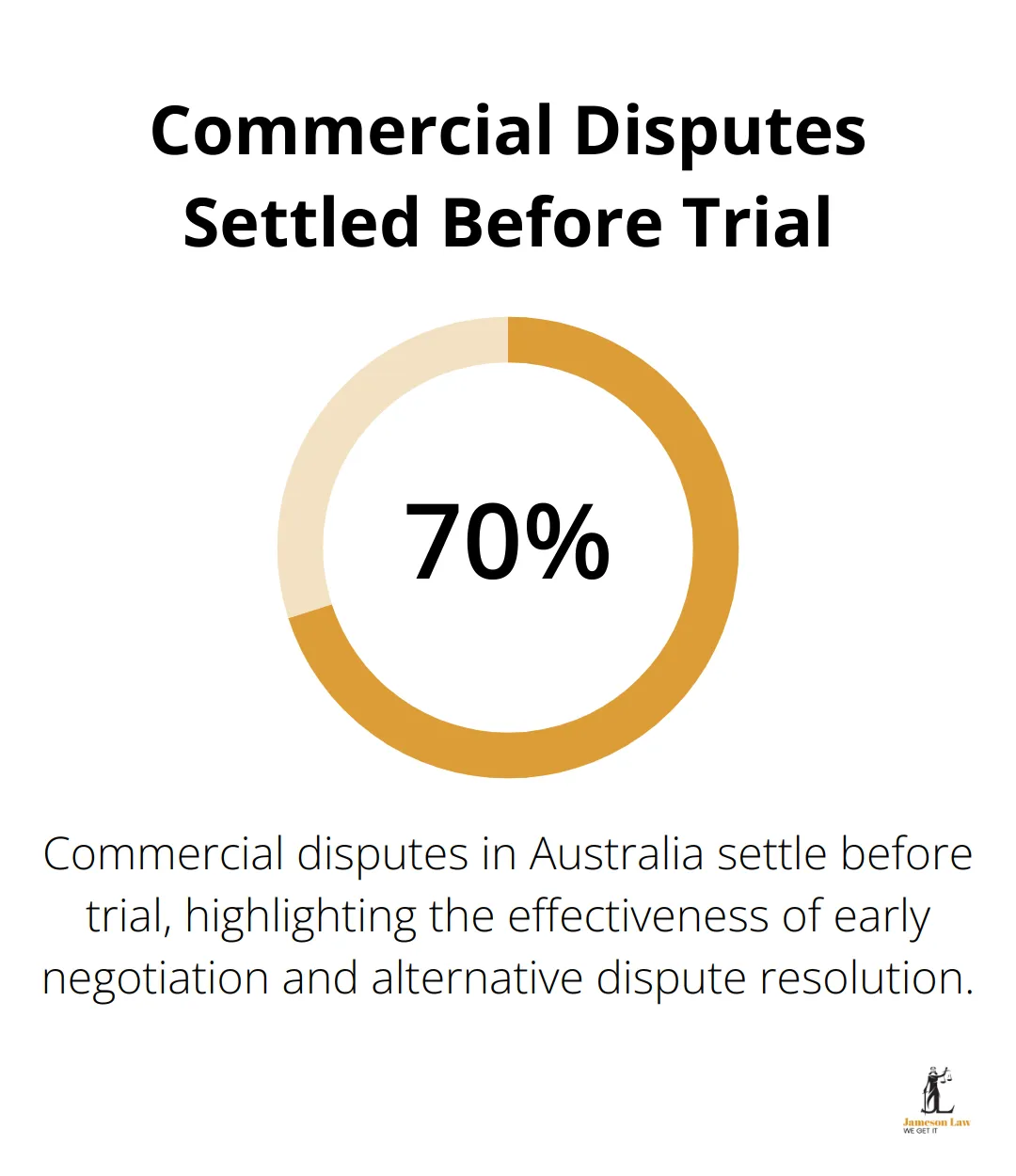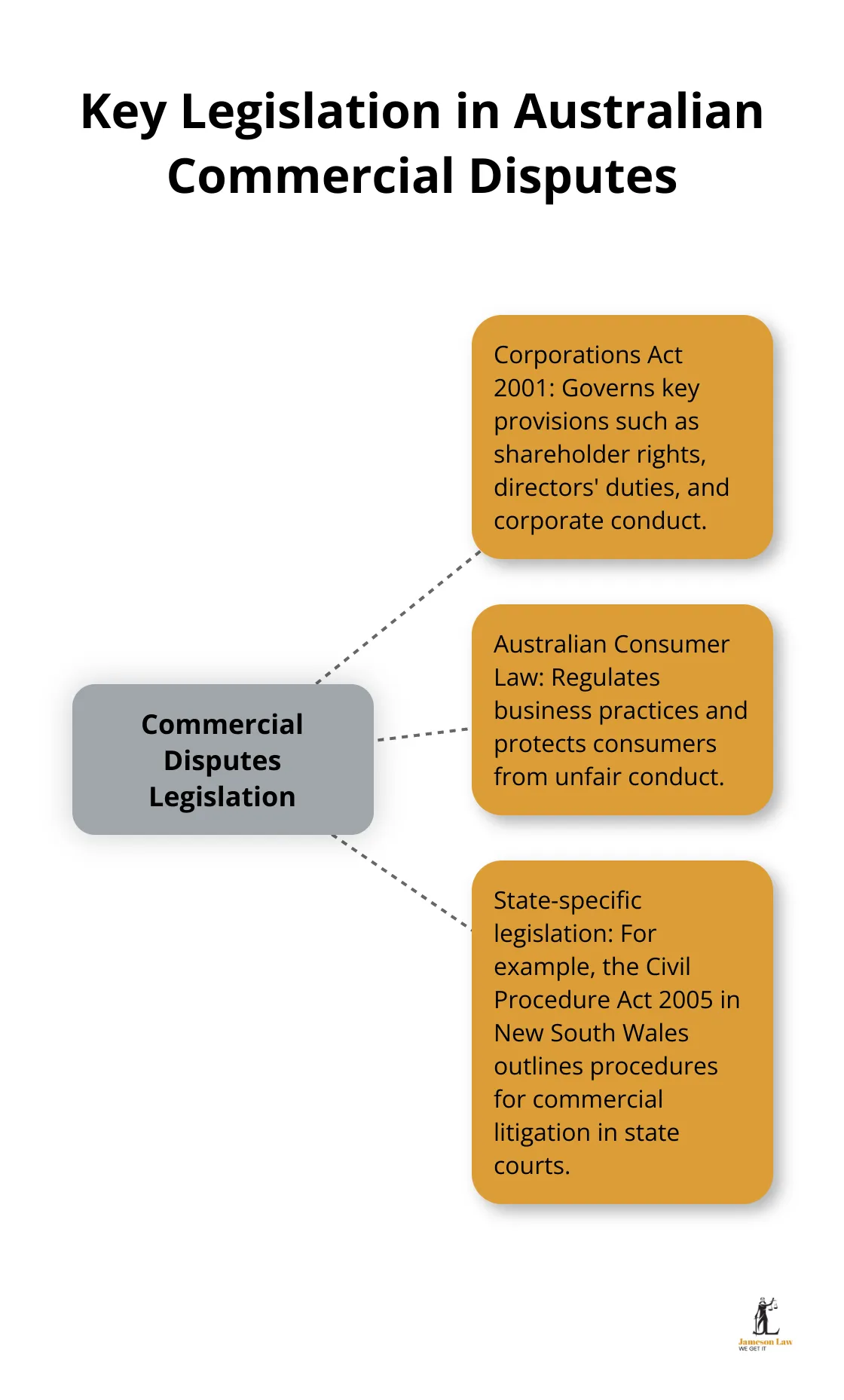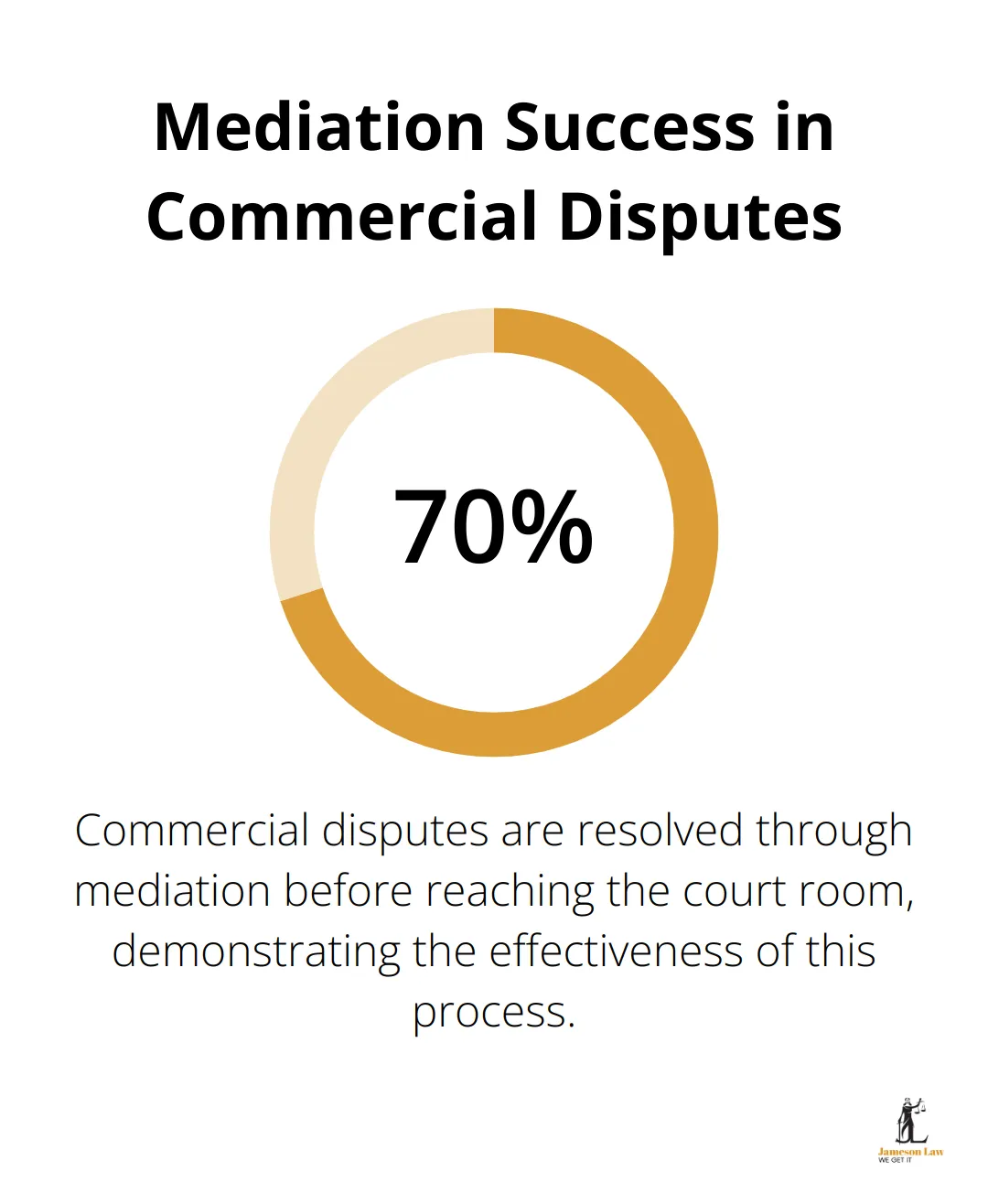Commercial disputes can wreak havoc on businesses, disrupting operations and damaging relationships. At Jameson Law, we’ve seen firsthand how these conflicts can escalate if not handled properly.
Understanding commercial disputes law is essential for protecting your business interests and finding effective resolutions. This guide will equip you with strategies to navigate the complex landscape of businessFLICT and dispute resolution in Australia.
What Are Commercial Disputes?
Types of Commercial Disputes
Commercial disputes encompass a wide range of conflicts between businesses or individuals engaged in commercial transactions. Contract breaches top the list as the most common type, occurring when a party fails to meet its contractual obligations. Intellectual property disputes (such as trade mark infringements or patent violations) frequently arise in today’s innovation-driven market. Other prevalent forms include partnership disagreements, shareholder conflicts, and disputes over mergers and acquisitions.
Root Causes of Business Conflicts
Poor communication often sparks commercial disputes, leading to misunderstandings and conflicting interpretations of agreements. Unclear contract terms or ambiguous clauses create loopholes that parties may exploit. Financial pressures (like cash flow issues or market downturns) can strain business relationships and trigger disputes over payments or performance.
The Ripple Effect of Commercial Disputes
Commercial disputes impact far beyond the immediate parties involved. The Australian Small Business and Family Enterprise Ombudsman reports that many small business disputes are outside FOS. This underscores the significant financial toll these conflicts extract.
Disputes damage reputations, sever long-standing business relationships, and divert valuable time and resources from core business activities. In severe cases, prolonged disputes lead to business closures and job losses, affecting employees and their families.
Proactive Measures for Dispute Prevention
Clear, well-drafted contracts form the foundation of dispute prevention. Regular contract reviews and updates help identify potential issues before they escalate into full-blown conflicts. Effective communication channels and dispute resolution mechanisms in agreements provide a framework for addressing disagreements constructively.
The Value of Early Intervention
Early legal intervention significantly reduces the impact of commercial disputes. The Australian Dispute Resolution Centre reports that over 70% of commercial disputes in Australia settle before trial, highlighting the effectiveness of early negotiation and alternative dispute resolution methods.
Professional legal advice at the first sign of a dispute helps businesses understand their rights and obligations, assess the strength of their position, and develop a strategic approach to resolution. This early action saves substantial time and money compared to protracted litigation.

As we move forward, we’ll explore the legal framework that governs commercial disputes in Australia, providing you with the knowledge to navigate these complex waters effectively.
Navigating Australia’s Commercial Dispute Framework
Key Legislation Shaping Commercial Disputes
Australia’s legal landscape for commercial disputes is complex and multifaceted. The framework balances the interests of businesses while promoting fair and efficient resolution of conflicts.
The Corporations Act 2001 stands as the cornerstone of commercial law in Australia. It governs key provisions such as shareholder rights, directors’ duties, and corporate CONDUCT. The Australian Consumer Law (found in Schedule 2 of the Competition and Consumer Act 2010) plays a vital role in regulating business practices and protecting consumers from unfair CONDUCT.
State-specific legislation adds another layer of complexity. For instance, in New South Wales, the Civil PROCEDURE Act 2005 outlines the PROCEDURES for initiating and managing commercial litigation in state courts.

The Court System’s Role in Dispute Resolution
Australian courts operate on a hierarchical system, with each level playing a distinct role in commercial dispute resolution. The Federal Court of Australia has jurisdiction over matters arising under federal laws, including corporations and competition law.
State Supreme Courts handle significant commercial matters within their jurisdictions. The Supreme Court of New South Wales, for example, has a dedicated Commercial List to expedite complex business disputes.
Embracing Alternative Dispute Resolution
Courts increasingly encourage parties to explore alternative dispute resolution (ADR) methods before PROCEEDING to trial. The Federal Court of Australia Act 1976 empowers judges to refer matters to mediation or arbitration at any stage of PROCEEDINGS.
Mediation has proven particularly effective in resolving disputes. This underscores the value of skilled mediators in facilITATING mutually beneficial outcomes.
Arbitration offers a more formal alternative to court PROCEEDINGS. The International Arbitration Act 1974 provides a framework for enforcing international arbitration agreements and awards in Australia, making it an attractive option for cross-border disputes.
Practical Strategies for System Navigation
Understanding this legal framework is essential, but practical application is key. Consider these strategies:
- Conduct a thorough legal audit of your business contracts and practices to identify POTENTIAL areas of dispute.
- Incorporate well-drafted dispute resolution clauses in all commercial agreements, specifying preferred ADR methods and jurisdictions.
- Engage early with experienced legal counsel when disputes arise. Early intervention often leads to more cost-effective resolutions.
- Consider the reputational impact of litigation. ADR methods offer greater confidentiality and can help preserve business relationships.
- Stay informed about legislative changes. The Australian legal landscape is dynamic, with recent reforms aimed at streamlining commercial dispute processes.
As we move forward, we’ll explore specific strategies for resolving commercial disputes, including negotiation techniques, the arbitration process, and when litigation becomes necessary.
Effective Strategies for Commercial Dispute Resolution
Negotiation: The First Line of Defence
Negotiation often serves as the initial step in resolving commercial disputes. Preparation is paramount. A thorough assessment of your position (including strengths, weaknesses, and desired outcomes) will equip you for more strategic discussions.
A collaborative approach trumps adversarial tactics. Focus on underlying interests rather than rigid pOSITIONS. In a contract dispute, for instance, understanding each party’s core needs can spark creative solutions that benefit everyone involved.
Timing plays a critical role. Early negotiations, before pOSITIONS solidify, increase the likelihood of a favourable outcome. However, don’t hesitate to walk away if the terms clash with your business interests.
Mediation: A Structured Path to Agreement
When direct talks hit a wall, mediation offers a flexible yet structured alternative. Australian courts increasingly push for mediation before trial. This process resolves over 70% of commercial disputes before they reach the court room.

A neutral mediator facilITATEs communication and helps parties find common ground. They don’t impose decisions but guide the process towards mutually acceptable solutions.
The confidential nature of mediation protects sensitive business information and relationships. It proves particularly valuable in disputes where ongoing business partnerships hang in the balance (such as supplier conflicts or partnership disagreements).
Arbitration: Binding Decisions Outside the Courtroom
Arbitration provides a more formal dispute resolution process while retaining advantages over litigation. It typically moves faster and costs less than court PROCEEDINGS. The arbitrator’s decisiON is usually final and binding, offering a definitive resolution.
G+T has provided a step by step guide to understanding International Arbitration in Australia, with regard to best practice and recent trends and developments.
Arbitration’s flexibility allows parties to select arbitrators with specific industry expertise, ensuring more informed decisiON-making. This benefit shines in complex technical or industry-specific disputes.
Litigation: When All Else Fails
Sometimes, litigation becomes the only way to protect your business interests. While often viewed as a last resort due to time and cost factors, it remains a necessary tool in certain situatIONS.
If litigation proves inevitable, thorough preparation is essential. This includes:
- LitiGATORS to be thoroughly prepared for trial by sharing a brief overview of key elements in litigation that require the most attention and thought.
- Identifying and preparing key witnesses
- Developing a clear legal strategy with your counsel
Stay open to settlement opportunities, even during litigation. These can lead to faster and more cost-effective resolutions.
Professional Guidance: Navigating the Complexities
Professional legal representatION plays a crucial role in resolving commercial disputes efficiently and effectively. Experienced lawyers (like those at Jameson Law) provide tailored advice and support throughout the entire dispute resolution process.
Final Thoughts
Commercial disputes law requires a strategic approach and a deep understanding of the legal landscape. Clear communication, well-drafted contracts, and proactive measures form the foundation of dispute prevention. When conflicts arise, various resolution methods offer pathways to resolution, from negotiation and mediation to arbitration and litigation.
The impact of commercial disputes extends beyond immediate financial concerns, affecting relationships, reputations, and long-term business viability. Early intervention and professional guidance significantly reduce these risks and often lead to more favourable outcomes. Expert legal advice proves essential for effectively managing commercial disputes.
At Jameson Law, we bring extensive experience to help businesses navigate the complexities of commercial conflicts. Our team provides tailored strategies, from contract reviews and dispute prevention to representatION in negotiations, mediations, and court rooms. We explore all available options to achieve the best outcomes for our clients, always aiming to preserve business relationships and minimise disruptION to operatIONS.













